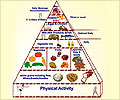
Guided by lifestyle advisors, seniors participating in the study made small, sustainable changes in their routines (such as visiting a museum with a friend once a week) that led to measurable gains in quality of life, including lower rates of depression and better reported satisfaction with life.
According to lead investigator Florence Clark, the study validates the current trend in public health strategies to focus on preventing illness and disability, as opposed to treating issues once they have already begun to negatively impact health.
"What is critical is that, as we age, we continue to be engaged in life through a sustainable mix of productive, social, physical and spiritual activities," Clark said.
"This goal of prevention and wellness is really a key to health care reform, and results in cost savings to society.
"The emphasis now is prevention. There are non-pharmacologic interventions that work," she said.
Advertisement
"Being engaged in a social life has a positive effect on health, but the public is not sufficiently aware of how key this is to successful aging," she said.
Advertisement
The study showed that, compared with other interventions, this lifestyle intervention was cost-effective.
For every dollar spent, there was a significant enough gain in health outcomes to justify the expenditure, according to Clark.
"Making positive changes in how we live each day, and sustaining those changes over the long term, is critical for maintaining independence and healthy aging," she stated.
The Well Elderly 2 trial was performed between 2004 and 2009, with the write-up appearing in the June 2 issue of the Journal of Epidemiology and Community Health.
Source-ANI










